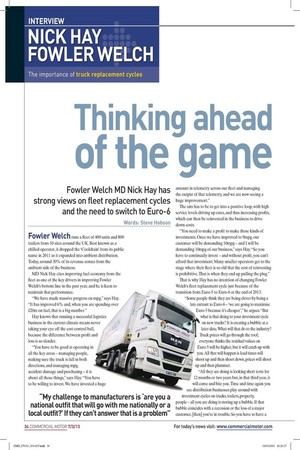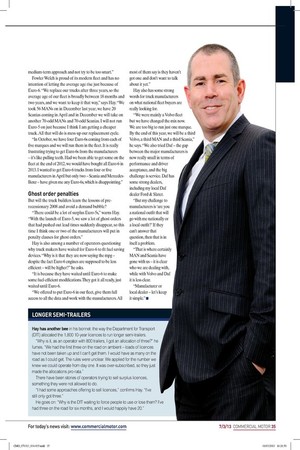Thinking ahead of the game Fowler Welch MD Nick Hay
Page 25

Page 26

If you've noticed an error in this article please click here to report it so we can fix it.
has strong views on fleet replacement cycles and the need to switch to Euro-6 Words: Steve Hobson Fowler Welch runs a fleet of 400 units and 800 trailers from 10 sites around the UK. Best known as a chilled operator, it dropped the 'Coo'chain' from its public name in 2011 as it expanded into ambient distribution. Today, around 30% of its revenue comes from the ambient side of the business.
MD Nick Hay cites improving fuel economy from the fleet as one of the key drivers in improving Fowler Welch's bottom line in the past year, and he is keen to maintain that performance.
"We have made massive progress on mpg," says Hay. "It has improved 6% and, when you are spending over £20m on fuel, that is a big number."
Hay knows that running a successful logistics business in the current climate means never taking your eye off the cost-control ball, because the difference between profit and loss is so slender.
"You have to be good at operating in all the key areas — managing people, making sure the truck is full in both directions, and managing mpg, accident damage and purchasing — it is about all those things," says Hay. "You have to be willing to invest. We have invested a huge amount in telemetry across our fleet and managing the output of that telemetry, and we are now seeing a huge improvement."
The aim has to be to get into a positive loop, with high service levels driving up rates, and thus increasing profits, which can then be reinvested in the business to drive down costs.
"You need to make a profit to make those kinds of investments. Once we have improved to 9mpg, our customer will be demanding lOmpg — and Twill be demanding lOmpg of our business," says Hay. "So you have to continually invest — and without profit, you can't afford that investment. Many smaller operators get to the stage where their fleet is so old that the cost of reinvesting is prohibitive. That is when they end up pulling the plug."
That is why Hay has no intention of changing Fowler Welch's fleet replacement cycle just because of the transition from Euro-5 to Euro-6 at the end of 2013. "Some people think they are being clever by being a late entrant to Euro-6 — 'we are going to maximise Euro-5 because it's cheaper'," he argues. "But what is that doing to your investment cycle on new trucks? It is creating a bubble at a later date. What will that do to the industry? Truck prices will go through the roof; everyone thinks the residual values on Euro-5 will be higher, but it will catch up with you. All that will happen is lead times will shoot up and then shoot down, prices will shoot up and then plummet. ital "All they are doing is looking short term for 12 months or two years but, in that third year, it will come and bite you. Time and time again you see distribution businesses play around with investment cycles on trucks, trailers, property, people — all you are doing is storing up a bubble. If that bubble coincides with a recession or the loss of a major customer, [then] you're in trouble. So you have to have a medium-term approach and not try to be too smart."
Fowler Welch is proud of its modern fleet and has no intention of letting the average age rise just because of Euro-6. "We replace our trucks after three years, so the average age of our fleet is broadly between 18 months and two years, and we want to keep it that way," says Hay. "We took 56 MANs on in December last year, we have 20 Scanias coming in April and in December we will take on another 70-odd MANs and 70-odd Scanias. Twill not run Euro-5 on just because I think I am getting a cheaper truck. All that will do is mess up our replacement cycle.
"In October, we have four Euro-6s coming from each of five marques and we will run them in the fleet. It is really frustrating trying to get Euro-6s from the manufacturers — it's like pulling teeth. Had we been able to get some on the fleet at the end of 2012, we would have bought all Euro-6 in 2013.1 wanted to get Euro-6 trucks from four or five manufacturers in April but only two — Scania and MercedesBenz — have given me any Euro-6s, which is disappointing."
Ghost order penalties But will the truck builders learn the lessons of prerecessionary 2008 and avoid a demand bubble?
"There could be a lot of surplus Euro-5s," warns Hay. "With the launch of Euro-5, we saw a lot of ghost orders that had pushed out lead times suddenly disappear, so this time I think one or two of the manufacturers will put in penalty clauses for ghost orders."
Hay is also among a number of operators questioning why truck makers have waited for Euro-6 to fit fuel saving devices. "Why is it that they are now saying the mpg — despite the fact Euro-6 engines are supposed to be less efficient — will be higher9" he asks.
"It is because they have waited until Euro-6 to make some fuel-efficient modifications. They got it all ready, just waited until Euro-6.
"We offered to put Euro-6 in our fleet, give them full access to all the data and work with the manufacturers. All most of them say is they haven't got one and don't want to talk about it yet."
Hay also has some strong words for truck manufacturers on what national fleet buyers are really looking for.
"We were mainly a Volvo fleet but we have changed the mix now. We are too big to run just one marque. By the end of this year, we will be a third Volvo, a third MAN and a third Scania," he says. "We also tried Daf — the gap between the major manufacturers is now really small in terms of performance and driver acceptance, and the big challenge is service. Daf has some strong dealers, including my local Daf dealer Ford & Slater.
"But my challenge to manufacturers is 'are you a national outfit that will go with me nationally or a local outfit?' If they can't answer that question, then that is in itself a problem.
"That is where certainly MAN and Scania have gone with us — it is clear who we are dealing with, while with Volvo and Daf it is less clear.
"Manufacturer or local dealer — let's keep it simple." • Hay has another bee in his bonnet: the way the Department for Transport (DfT) allocated the 1,800 10-year licences to run longer semi-trailers.
"Why is it, as an operator with 800 trailers, I got an allocation of three?" he fumes. "We had the first three on the road on ambient — loads of licences have not been taken up and I can't get them. I would have as many on the road as I could get. The rules were unclear. We applied for the number we knew we could operate from day one. It was over-subscribed, so they just made the allocations pro-rata."
There have been stories of operators trying to sell surplus licences, something they were not allowed to do.
"I had some approaches offering to sell licences," confirms Hay. "I've still only got three."
He goes on: "Why is the DfT waiting to force people to use or lose them? I've had three on the road for six months, and I would happily have 20."







































